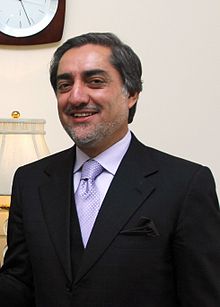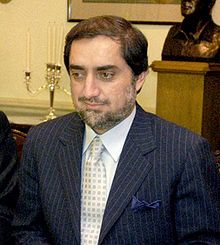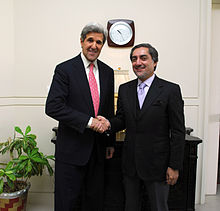- Abdullah Abdullah
-
عبدالله عبدالله
Dr. Abdullah Abdullah
Dr. Abdullah in October 2009 Foreign Minister of Afghanistan In office
October 2, 2001 – April 20, 2005President Hamid Karzai Preceded by Wakil Ahmad Muttawakil Succeeded by Rangin Dadfar Spanta Personal details Born 1960
Kabul, AfghanistanNationality Afghan Children 4 Alma mater Kabul Medical University Religion Islam Website www.drabdullah.af Abdullah Abdullah (Persian: عبدالله عبدالله) is an Afghan politician and a doctor of medicine. He was an adviser and friend to Ahmad Shah Massoud, legendary anti-Taliban leader and commander known as the "Lion of Panjshir". After the fall of the Taliban regime, Dr. Abdullah served as Afghanistan's Foreign Minister from 2001 until 2005. In 2009 Abdullah ran as an independent candidate in the Afghan presidential election and came in second place with 30.5% of the total votes. On November 1, 2009, Abdullah quit the runoff election that would have taken place six days later, on November 7, due to large-scale allegations of fraud against his opponent Hamid Karzai.[1] In 2010 Abdullah created the Coalition for Change and Hope which is the leading democratic opposition movement in Afghanistan.[2][3]
Contents
Early life
Abdullah was born in Kabul, Afghanistan in 1960.[4] Until he became a government minister, he had only one name, Abdullah; demands from Western newspaper editors for a second name led him to adopt the name Abdullah Abdullah.[5] Like most Afghans, he was raised in a devout Muslim family. Abdullah Abdullah is of mixed Tajik and Pashtun ethnicity.[6][7][8] His father, Ghullam Muhayuddin Khan, was from the Kandahar region, and was a high ranking government official who had risen through the ranks. Abdullah's early years were split between living in Kandahar and Kabul, where his father was serving as an administrator in the land survey and subsequently the inspection section of the Prime Minister’s office. A number of his ancestors had worked in the court of the royal house of Afghanistan in past centuries.[citation needed]
Eventually, Abdullah’s family settled in Kabul where his father was appointed as a senator by King Zahir Shah. Abdullah’s father had a great impact on his son's life.
Education and medical career
Abdullah was a top student throughout his elementary and high school years. He graduated from Naderia High School in 1976 and went on to study ophthalmology at Kabul University’s Department of Medicine where he graduated and received his M.D. degree in 1983.[9]
After receiving his degree, Abdullah served as the resident ophthalmologist at Noor Eye Institute in Kabul until 1986. Starting in 1985, Abdullah left the country due to the social and political unrest during the leftist government and went on to work at the Syed Jamaluddin Afghani Eye Hospital for Afghan Refugees in Peshawar, Pakistan.
Resistance against invasion
Soviet war in Afghanistan
In September 1985 Abdullah became the Head of the Health Department for the Panjshir Resistance Front coordinating treatments and health care for the resistance fighters and the civilian population. Abdullah soon became a close associate and advisor to Commander Ahmad Shah Massoud in the Soviet war in Afghanistan.[10] Following the withdrawal of Soviet troops from Afghanistan the Wall Street Journal named Massoud "the Afghan who won the Cold War".[11]
Islamic State of Afghanistan
After the fall of the communist Najibullah-regime in 1992, the Afghan political parties agreed on a peace and power-sharing agreement (the Peshawar Accords). The Peshawar Accords created the Islamic State of Afghanistan and appointed an interim government. According to Human Rights Watch:
"The sovereignty of Afghanistan was vested formally in the Islamic State of Afghanistan, an entity created in April 1992, after the fall of the Soviet-backed Najibullah government. [...] With the exception of Gulbuddin Hekmatyar's Hezb-e Islami, all of the parties [...] were ostensibly unified under this government in April 1992. [...] Hekmatyar's Hezb-e Islami, for its part, refused to recognize the government for most of the period discussed in this report and launched attacks against government forces and Kabul generally. [...] Shells and rockets fell everywhere."[12]Gulbuddin Hekmatyar received operational, financial and military support from Pakistan.[13] Afghanistan expert Amin Saikal concludes in Modern Afghanistan: A History of Struggle and Survival:
"Pakistan was keen to gear up for a breakthrough in Central Asia. [...] Islamabad could not possibly expect the new Islamic government leaders [...] to subordinate their own nationalist objectives in order to help Pakistan realize its regional ambitions. [...] Had it not been for the ISI's logistic support and supply of a large number of rockets, Hekmatyar's forces would not have been able to target and destroy half of Kabul."[14]Gulbuddin Hekmatyar was defeated militarily in Kabul in late 1994 by then minister of defense Ahmad Shah Massoud's forces. Abdullah worked as an advisor for Massoud. In 1995 Abdullah became the Spokesperson for the Islamic State of Afghanistan.
Taliban Emirate versus United Front
On September 27, 1996, the Taliban seized power in Kabul with military support by Pakistan and financial support by Saudi Arabia and established the Islamic Emirate of Afghanistan.[15] Following the capture of Kabul by the Taliban, the United Islamic Front (Northern Alliance) was created under the leadership of Ahmad Shah Massoud. Dr. Abdullah became the United Front's Minister of Foreign Affairs. Islamic State of Afghanistan elements of the United Front, including the Defense Minister Ahmad Shah Massoud and the Foreign Minister Abdullah Abdullah, remained Afghanistan's internationally recognized government. The Taliban Emirate received no diplomatic recognition from the international community (except from Saudi Arabia, Pakistan and the United Arab Emirates).
In early 2001 Abdullah traveled with Ahmad Shah Massoud to Brussels where Massoud addressed the European Parliament asking the international community to provide humanitarian help to the people of Afghanistan.[16] see video Dr. Abdullah translated when Massoud stated that the Taliban and Al Qaeda had introduced "a very wrong perception of Islam" and that without the support of Pakistan and Bin Laden the Taliban would not be able to sustain their military campaign for up to a year.[17] On this visit to Europe Massoud also warned that his intelligence had gathered information about a large-scale attack on U.S. soil being imminent.[18]
Islamic Republic of Afghanistan
See also: Bonn Agreement (Afghanistan) and 2001 in Afghanistan
 Dr. Abdullah at the Pentagon in 2004
Dr. Abdullah at the Pentagon in 2004
Foreign ministry
In October 2001 the Taliban regime was overthrown by Operation Enduring Freedom including NATO and United Front forces. As a result of the Bonn conference on Afghanistan, Abdullah was appointed Minister of Foreign Affairs of the Interim Administration in December 2001.
Following the 2004 Afghanistan Presidential Elections, Abdullah was one of the few people who kept their position from the Transitional Government and was re-appointed as Minister of Foreign Affairs for another year. In 2005 he resigned his position.[19]
2009 presidential election
On May 6, 2009, Abdullah registered as an Independent candidate for the 2009 Afghan presidential election, running against incumbent president Hamid Karzai. Abdullah selected as his running mates Humayun Shah Asefi as his First Vice President and Dr. Cheragh Ali Cheragh (a surgeon from Kabul who is a practicing Shia) as Second Vice President. Afghanistan has an Executive structure featuring two Vice Presidents, a First VP and a Second VP, to help ensure a stable government by attempting to provide ethnic and religious balance to senior government leadership positions. Unofficial and non-certified electoral results were announced during the day on September 16, 2009, showing that Abdullah was in second position with 27.8% of the total votes cast. President Karzai did not achieve the 50.01% vote majority required to avoid a runoff election. A large number of fraudulent ballots, mostly belonging to Karzai's camp, were disallowed by the Independent Afghan Electoral Commission. Karzai came under intense international political and diplomatic pressure from international leaders because of allegations of large-scale fraud. Hamid Karzai eventually agreed to participate in a designated head to head runoff election (held between the contenders with the two largest numbers of total votes in the first election) which was scheduled nationwide for November 7, 2009.[20]
On November 1, 2009, Abdullah announced that he had decided to withdraw from the runoff election, citing his lack of faith in the President Karzai government's ability to hold a "fair and transparent" second election process. Subsequently Hamid Karzai was declared the winner by the Afghan Electoral Commission (essentially winning by default).[21][22]
Coalition for Change and Hope
After the 2009 Afghan Presidential Elections, Abdullah created the Coalition for Change and Hope (CCH). The CCH presents the leading democratic opposition movement against the government of Hamid Karzai.[23][24]
In the September 18, 2010, parliamentary election the Coalition for Change and Hope won more than 90 seats out of 249 seats becoming the main opposition party.[25][26] As a result, it is assumed that the new Parliament will introduce some checks and balances on the Presidential power.[27][28]
Regarding the Taliban insurgency and Karzai's strategy of negotiations Dr. Abdullah stated:
- "I should say that Taliban are not fighting in order to be accommodated. They are fighting in order to bring the state down. So it's a futile exercise, and it's just misleading. ... There are groups that will fight to the death. Whether we like to talk to them or we don't like to talk to them, they will continue to fight. So, for them, I don't think that we have a way forward with talks or negotiations or contacts or anything as such. Then we have to be prepared to tackle and deal with them militarily. In terms of the Taliban on the ground, there are lots of possibilities and opportunities that with the help of the people in different parts of the country, we can attract them to the peace process; provided, we create a favorable environment on this side of the line."[29]
Massoud Foundation
Abdullah has been the Secretary General of the Massoud Foundation since June 2006. The Massoud Foundation is an independent, non-aligned, non-profitable and non-political organization established by people who have been affected by the life of Massoud. It provides humanitarian assistance to Afghans especially in the fields of health care and education. It also runs programs in the fields of culture, construction, agriculture and welfare.
References
- ^ Afghan's Karzai effectively handed 2nd term
- ^ "Afghan opposition says new parliament can check Karzai". Reuters. November 24, 2010. http://www.reuters.com/article/idUSTRE6AN2TM20101124.
- ^ "2010 Afghan Parliamentary Election: Checks and Balances of Power". Khaama Press. December 9, 2010. http://www.khaama.com/?p=1302.
- ^ Official website of Dr. Abdullah
- ^ Dexter Filkins, The Forever War (New York: Vintage Books/Random House, 2009; orig. ed. 2008), p. 66.
- ^ http://www.iiss.org/publications/strategic-comments/past-issues/volume-7---2001/volume-7---issue-10/post-taliban-afghanistan/
- ^ Farmer, Ben (August 13, 2009). "Afghan election: Hamid Karzai's rival Abdullah Abdullah crosses ethnic divide". The Daily Telegraph (London). http://www.telegraph.co.uk/news/worldnews/asia/afghanistan/6018945/Afghan-election-Hamid-Karzais-rival-Abdullah-Abdullah-crosses-ethnic-divide.html. Retrieved April 23, 2010.
- ^ "Poll shows Afghan vote headed for second round". Reuters. 2009-08-14. http://www.reuters.com/article/worldNews/idUSTRE57D0SE20090814. Retrieved 2009-08-15.
- ^ "The Transition to Democracy in Afghanistan and the Challenges Ahead". Council on Foreign Relations. October 17, 2002. http://www.cfr.org/publication/5105/transition_to_democracy_in_afghanistan_and_the_challenges_ahead.html?breadcrumb=%2Feducators%2Fmultimedia%3Fgroupby%3D3%26filter%3D2002%26page%3D2. Retrieved 2009-05-15.
- ^ "Profile: Abdullah Abdullah". BBC News. 22 March 2006. http://news.bbc.co.uk/1/hi/world/south_asia/1672882.stm. Retrieved 2009-05-15.
- ^ "Charlie Rose March 26, 2001". CBS. 2001. http://video.google.com/videoplay?docid=2911290068493351924#.
- ^ "Blood-Stained Hands, Past Atrocities in Kabul and Afghanistan's Legacy of Impunity". Human Rights Watch. http://www.hrw.org/en/reports/2005/07/06/blood-stained-hands.
- ^ Neamatollah Nojumi. The Rise of the Taliban in Afghanistan: Mass Mobilization, Civil War, and the Future of the Region (2002 1st ed.). Palgrave, New York.
- ^ Amin Saikal. Modern Afghanistan: A History of Struggle and Survival (2006 1st ed.). I.B. Tauris & Co Ltd., London New York. p. 352. ISBN 1-85043-437-9.
- ^ Coll, Ghost Wars (New York: Penguin, 2005), 14.
- ^ "Massoud in the European Parliament 2001". EU media. 2001. http://www.youtube.com/watch?v=e1iCsEnXdIw.
- ^ "Massoud in the European Parliament 2001". EU media. 2001. http://www.youtube.com/watch?v=hkw-g27AUKE&feature=related.
- ^ Defense Intelligence Agency (2001) report http://www.gwu.edu/~nsarchiv/NSAEBB/NSAEBB97/tal32.pdf
- ^ "Afghan President Karzai appoints new cabinet". Pakistan Times. 24 December 2004. http://pakistantimes.net/2004/12/24/top5.htm. Retrieved 2009-05-15.
- ^ "Why Karzai's Rival Abdullah Won't Budge on Runoff". Time. September 21, 2009. http://www.time.com/time/world/article/0,8599,1925090,00.html?xid=rss-topstories. Retrieved 2009-09-21.
- ^ Abdlullah Quits Afghan Presidential Race
- ^ Karzai Challenger Drops Out Of Runoff Election by National Public Radio
- ^ "Afghan opposition says new parliament can check Karzai". Reuters. November 24, 2010. http://www.reuters.com/article/idUSTRE6AN2TM20101124.
- ^ "2010 Afghan Parliamentary Election: Checks and Balances of Power". Khaama Press. December 9, 2010. http://www.khaama.com/?p=1302.
- ^ "Afghan opposition says new parliament can check Karzai". Reuters. November 24, 2010. http://www.reuters.com/article/idUSTRE6AN2TM20101124.
- ^ "2010 Afghan Parliamentary Election: Checks and Balances of Power". Khaama Press. December 9, 2010. http://www.khaama.com/?p=1302.
- ^ "Afghan opposition says new parliament can check Karzai". Reuters. November 24, 2010. http://www.reuters.com/article/idUSTRE6AN2TM20101124.
- ^ "2010 Afghan Parliamentary Election: Checks and Balances of Power". Khaama Press. December 9, 2010. http://www.khaama.com/?p=1302.
- ^ "Abdullah Abdullah: Talks With Taliban Futile". National Public Radio (NPR). 2010-10-22. http://www.npr.org/templates/story/story.php?storyId=130757482.
External links
- Dr. Abdullah with Ahmad Shah Massoud in the European Parliament
- Dr. Abdullah Abdullah Official Presidential Campaign Website
- Appearances on C-SPAN
- Abdullah Abdullah on Charlie Rose
- Abdullah Abdullah collected news and commentary at The Guardian
- Abdullah Abdullah collected news and commentary at The New York Times
- Karzai's Challenger Dr. Abdullah Abdullah, Aryn Baker in Pashir, Time, 5 August 2009
- Abdullah Abdullah, Tony Cross, Radio France Internationale, 12 August 2009
- Abdullah claims fraud, says will fight Karzai victory claims, Radio France Internationale, 18 September 2009
- Why a second round in 2009 election? Radio France Internationale
- Karzai Challenger Drops Out Of Runoff Election, NPR
- Video: Abdullah Abdullah at the Asia Society, New York, 5/27/2010
Minister of Foreign Affairs Deputy Foreign Minister
for Political AffairsAbdorrahim Sherizai · Zalmai Aziz (2003-2007) · Mohammad Kabir Farahi (2007-2010) · Eklil Ahmad Hakimi (2010-2011)Deputy Foreign Minister
for Administration AffairsAbdul H. Haider (2010-present)Deputy Foreign Minister
for Economic AffairsMahmoud Saikal (2005-2006)Chief of Staff to the President Said Tayeb Jawad (2002-2003) · Mohammad Omar Daudzai (2003-2005) · Jawed Ludin (2005-2007) · Omar Daudzai (2007-present)Chairman National Security Council Zalmai Rasool (2002-2009) · Rangin Dadfar Spanta (2010-present)Director of United Nations Affairs
and International ConferencesSpokesmen of the
Ministry of Foreign AffairsOmar Samad (2001-2006) · Ahmad Zaher Faqiri (2010-present)Permanent Representative
to the UN (New York)Ravan Farhâdi (1993-2006) · Zahir Tanin (2006-present)Permanent Representative
to the UN (Geneva)Akbar Kherad · Mohammad Nabi Amani · Sher Ahmad Nasri · Homayon Tandar · Shamsuzzakir Kazemi · Assad Omar · Nangyalai Tarzi (2007-2010) · Zalmai Aziz (2010-present)Ambassador to the United States Chargé d'affaires to the United Kingdom Hameed HaamiAmbassador to Pakistan Nangyalai Tarzi (2002-2006) · Mohammad Anwar Anwarzai (2006-2007) · Abdul Khaliq Farahi · Majnoon Gulab (Chargé d'affaires) (2009-present)Ambassador to Iran Ambassador to India Ambassador to Russia Ambassador to Canada Omar Samad (2004-2009) · Jawed Ludin (2009-present)Ambassador to Australia Ambassador to Turkey Massoud Khalili (2007-2010) · Salahudin Rabani (2011-present)Ambassador to Spain Gul Ahmad Sherzada · Massoud Khalili (2010-present)Ambassador to Japan Mohammad Noor Akbary (Chargé d'affaires) (2002-2004) · Haron Amin (2004-2009) · Eklil Ahmad Hakimi (2009-2010) · Amin FatemyAmbassador to France Omar Samad (2009-present)Ambassador to Norway Categories:- 1960 births
- Living people
- Ophthalmologists
- People from Kabul
- Afghan Muslims
- Pashtun people
- Afghan Tajik people
- Government ministers of Afghanistan
Wikimedia Foundation. 2010.

